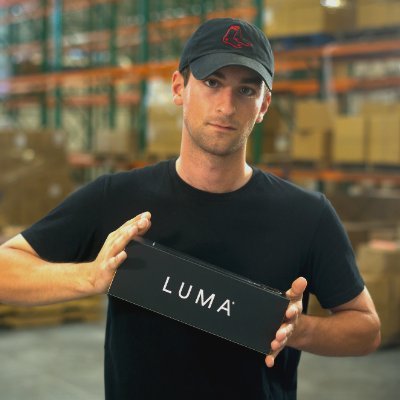
Founder, Luma
Jaden Brodeur has always been passionate for meaningful innovation designed to address big problems. At an early age, he took an interest in the concept of eliminating plastic-bottled water, fully convinced his adulthood should be free of single-use plastic bottles. He is co-founder of Luma, a sustainability company with a hyperfocus on hydration. Luma is building the first hydration unit to simultaneously combine UV-C light with optional filtration via activated Carbon. UV-C light is used to eradicate bacteria from the unit’s water contents and its interior surface, meaning regular cleaning is not required. Activated Carbon is used to treat water for other pollutants that UV-C light does not account for. In doing this, Luma is offering a unit that matches the water purity of bottled water while eliminating maintenance of the unit itself.
Jaden Brodeur is doing things WerthWatching:
- Fulfilling his longtime dream of innovating the water bottle industry.
- Recently participated in CCEI's Summer Fellowship program.
- “I left my job, worked on Luma unpaid, drained my bank, moved back home with my
mom to stay afloat, and have never been happier”
Tell us about Luma and how it came to be.
Going into my 2nd semester of junior year at UConn, I found a venture investing platform that I would be interning for in the summer, where I would be doing venture scouting. I wanted to come in prepared, so I started early making a list of young startups that I could reach out to when beginning my internship. I was browsing Kickstarter to find companies early in their development, and I came across a campaign for a product called Luma Bottle. I was blown away, because I had been fascinated by the idea of innovating the water bottle industry since I was a freshman in high school, and Luma Bottle was everything I’d been fantasizing about. It was the first company I put on my list, and then the first company I scheduled a call with when starting my internship.
When I got on that call, I was blown away to learn that it was a project led by another student my age across the country at BYU. There was no product, no capital, and no real team other than some friends of Willy’s at BYU helping out. We got to know each other well over the course of the next year and a half, touching base regularly as Willy worked towards getting the product concept built. In March of 2021, we were catching up after not speaking for a few months. He filled me in on what was going on. He was able to finally develop the product and fulfill pre-orders, but there was no direction after that. There was no capital, low inventory of a product that still needed work, nobody else working on it, and no clear path forward. Willy was also still finishing up school and working full time at a company in Utah.
I encouraged Willy to keep pushing forward, and helped put together a plan to raise capital, fund product improvements, build out a brand strategy, etc. It was clear that Willy and I had opposite skillsets, and we decided to team up and start a company. Less than 5 months later, we formed Luma Hydration Inc and closed our first investment of $75,000.
How is Luma using business to make a positive impact on the world?
Luma is a mission driven company dedicated to eliminating the use of plastic-packaged water. We’re combining meaningful innovation, premium quality, and impeccable design to build a sustainable hydration experience that’s healthier for our bodies and healthier for our planet.
Why are entrepreneurship and innovation important to you?
Entrepreneurship and innovation are important to me for more reasons to count, but I think the most important thing is that it gives me the opportunity to operate with complete creative freedom, which is what makes me happy. I feel fulfilled and feel like there’s nothing holding me back from reaching my full potential.
What did you learn from your experience at UConn that has helped you most in your career?
My time at UConn was an invaluable self-discovery experience. I learned more about myself in my 4 years at UConn than I could have ever imagined. I gained a better understanding of what I’m good at and what I’m not good at. I think I became much more self-aware.
Were there any connections that you made at UConn through the Werth Institute (staff, alumni, faculty, peers, etc.) that helped you beyond graduating?
I’ve made sure to stay well connected with David Noble. He was the one professor I had at UConn that truly inspired me, that I looked up to and admired.
I had also met Ryan Gresh (Class of 2009) during my time at UConn. He’s become someone I consider to be a great friend, and an incredible mentor. No matter what it is I’m going through, he’s someone I know I can always lean on for advice and has been guiding me through my entrepreneurial journey since day 1.
Are you still connected with UConn in any way and if yes, how so (college friends, mentoring current students, football games, etc.)?
Yes! My friends from UConn remain some of my closest friends and being a die-hard UConn basketball fan since my earliest memories, I attend as many home games as I can. I’m also participating in UConn’s summer fellowship program with CCEI.
Which business tool or resource do you recommend to others, and why?
Twitter! I can’t advocate enough for young professionals to use the platform more. To me, it’s a more authentic LinkedIn. I’ve built relationships with countless mentors, investors, founders, etc. from Twitter.
What is the biggest lesson you have learned so far since graduating?
When you leave college and step out into the “real-world,” the “guardrails” that have been in place since we were born suddenly disappear. It can be both intimidating and exciting. I felt like I could do anything I wanted. The biggest lesson I learned was to take advantage of that feeling.
I think a lot of people find themselves getting into jobs and careers that don’t really excite them, but it’s just what they feel like they’re “supposed” to do. I’ve learned to dismiss the status-quo and to do what makes me happy. We have limited time, and I don’t want to waste it.
What is the best advice you've ever received?
"Do what makes you happy".
It kind of builds off the lesson I just mentioned above, but I think it’s super important and it’s always on my mind. Finding happiness is the ultimate goal, and happiness looks different for everyone. For me, I like to create things. I like to make my own decisions, I like to think big, I like to live and work without someone telling me what I can and can’t do. Nobody wants to live with regrets, and I feel like I’m living regret-free, because I’m doing what makes me happy. Out of college, I had a great job in the city I wanted to live in my whole life, making great money, working with people I liked, but I didn’t truly feel happy because I felt like I was limited in what I was allowed to do. I left my job, worked on Luma unpaid, drained my bank, moved back home with my mom to stay afloat, and have never been happier. I’m young and can afford to take big risks. If things didn’t work out, I’d at least be doing what I loved. Fortunately, things have gone well 🙂
What did your time at UConn mean to you?
My time at UConn meant so much to me. I grew tremendously as a person, I learned about myself, I built both friendships and professional relationships that will last me a lifetime, and I had as much fun as I ever could have hoped for. I take extreme pride in UConn and hope to remain involved with the university in some way throughout my life.
What are you passionate about outside of work?
Golf, football, and UConn basketball!
What is next for you?
Fully focused on scaling Luma with the hope of one day building a generational company.
